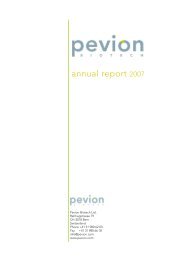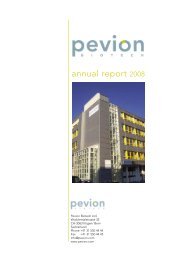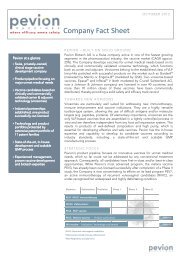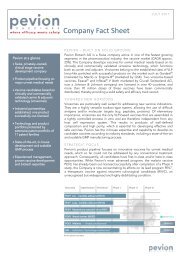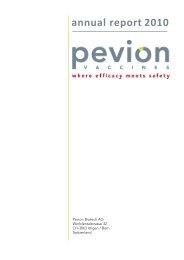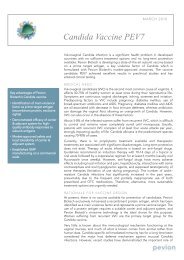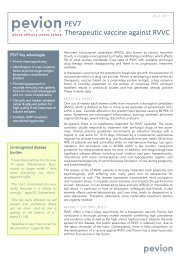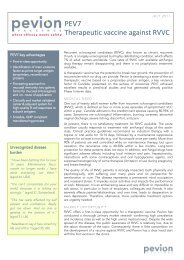ANNUAL REPORT - Pevion Biotech AG
ANNUAL REPORT - Pevion Biotech AG
ANNUAL REPORT - Pevion Biotech AG
You also want an ePaper? Increase the reach of your titles
YUMPU automatically turns print PDFs into web optimized ePapers that Google loves.
Alzheimer’s disease<br />
Alzheimer’s disease is one of the leading causes of dementia, a worldwide<br />
problem. This neurodegenerative disease disrupts cognitive and memory<br />
abilities and memory by the progressive accumulation of Aß peptides in<br />
areas of the brain serving cognitive functions. AD affects about 10% of the<br />
world’s population above 65 years of age. In this population there are<br />
currently about 8.3 million Alzheimer’s patients. As age advances, the<br />
incidence increases rapidly. One in 10 persons over 65 years of age and<br />
nearly half of those over 85 years of age suffer from AD.<br />
Primary prevention of Alzheimer's disease is not possible at present.<br />
Currently marketed products only provide partial and temporary relief from<br />
AD’s symptoms. They have failed to live up to the public's high expectations<br />
and offer such modest benefits that many doctors have doubts about<br />
prescribing them. Accordingly, there is no satisfactory cure for this disease<br />
and there is a large demand for an effective therapeutic vaccine.<br />
Alzheimer’s disease is a dementia that is defined by the presence of<br />
extracellular amyloid plaques in the brain, composed mainly of amyloid<br />
peptides. Several studies in transgenic mouse models of Alzheimer’s disease<br />
have revealed the potency of vaccination to prevent or even clear amyloid<br />
plaques Aß from mouse brain. <strong>Pevion</strong> <strong>Biotech</strong>’s Alzheimer’s disease vaccine<br />
is based on a conformationally optimized Aß epitope which is formulated<br />
with PeviPRO TM to favor a highly specific antibody immune response. <strong>Pevion</strong><br />
<strong>Biotech</strong>’s vaccine candidate is currently in preclinical development. The<br />
manufacturing of the vaccine under GMP standard is currently established<br />
including the corresponding analytical methods.<br />
Currently, the company is seeking partners for this project which aims to<br />
keep focusing on its key competences like prevention and treatment of<br />
infectious diseases.<br />
Malaria<br />
Malaria is one of the major public health challenges in the world’s<br />
developing countries. It is endemic in a total of 101 countries and territories<br />
across Africa, Asia, Eastern Europe and South America, inhabited by a total<br />
of 2.4 billion people – 40% of the world's population. Among the three<br />
different pathogens, Plasmodium falciparum is the most dangerous one.<br />
Each year, 300 to 500 million malaria infections occur and more than 2<br />
million people die. The vast majority of deaths occur among young children.<br />
Malaria has worsened in recent decades because some strains of the malaria<br />
parasite have developed resistance to drug treatments and mosquitoes have<br />
become impervious to insecticides.<br />
The malaria parasite Plasmodium falciparum has a complex life cycle<br />
involving three stages in the human body - the pre-erythrocytic stage, the<br />
blood stage and the sexual stage. The different stages are “visible” on the<br />
parasite itself, since it expresses stage-specific proteins on its surface. These<br />
proteins quite often bear antigens, which are prime targets for a malaria<br />
vaccine. Thus it is possible to design a vaccine specific for each stage. It is<br />
<strong>Pevion</strong> <strong>Biotech</strong>’s goal to develop a vaccine through which the parasite is<br />
attacked in different stages of its life cycle. It therefore focuses on a multicomponent<br />
(multi-valent) malaria vaccine: each component targets another<br />
antigen specific for a defined development stage. Such a multi-component<br />
vaccine induces synergistic protective effects and reduces the chance of the<br />
selection of resistant strains. <strong>Pevion</strong> <strong>Biotech</strong> uses its well-established<br />
virosome technology platform PeviPRO TM for the delivery of the newly<br />
developed peptide antigens. <strong>Pevion</strong> <strong>Biotech</strong> tested and optimized malaria<br />
peptides for their application as component of a multi-valent malaria<br />
vaccine. In consequent steps the company developed the vaccine<br />
formulations to clinical phase II which started in Q4 2005.<br />
<strong>Pevion</strong> <strong>Biotech</strong>_Annual Report2005_01_01_04_004 10/13



